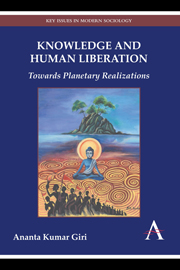Book contents
- Frontmatter
- Contents
- Preface
- Acknowledgments
- Foreword
- Introduction: The Calling of Transformative Knowledge
- Part I Nurturing the Garden of Transformational Knowledge: Roots and Variants
- 1 Knowledge and Human Liberation: Jürgen Habermas, Sri Aurobindo and Beyond
- 2 Beyond West and East: Co-evolution and the Calling of a New Enlightenment and Non-duality
- 3 The Modern Prince and the Modern Sage: Transforming Power and Freedom
- 4 Kant and Anthropology
- 5 Tocqueville as an Ethnographer of American Prison Systems and Democratic Practice
- Part II Rethinking Knowledge
- Part III Aspirations and Struggles for Liberation: Towards Planetary Realizations
- Afterword
- Advance Praise
5 - Tocqueville as an Ethnographer of American Prison Systems and Democratic Practice
from Part I - Nurturing the Garden of Transformational Knowledge: Roots and Variants
Published online by Cambridge University Press: 05 May 2013
- Frontmatter
- Contents
- Preface
- Acknowledgments
- Foreword
- Introduction: The Calling of Transformative Knowledge
- Part I Nurturing the Garden of Transformational Knowledge: Roots and Variants
- 1 Knowledge and Human Liberation: Jürgen Habermas, Sri Aurobindo and Beyond
- 2 Beyond West and East: Co-evolution and the Calling of a New Enlightenment and Non-duality
- 3 The Modern Prince and the Modern Sage: Transforming Power and Freedom
- 4 Kant and Anthropology
- 5 Tocqueville as an Ethnographer of American Prison Systems and Democratic Practice
- Part II Rethinking Knowledge
- Part III Aspirations and Struggles for Liberation: Towards Planetary Realizations
- Afterword
- Advance Praise
Summary
Even so there is irony in the fact that… Tocqueville came here to study the wonderful ways in which america incarcerated human beings, not how democracy freed them.
—Ronald Walters (1986, 4)Already in his own time Tocqueville was rightly considered to be the greatest thinker on democracy. Now that democracy at the end of the millennium seems to be beginning its triumphal procession over our entire globe, Tocqueville is still our best guide if we wish to understand democracy. Tocqueville has an undeniable right to such praise, since no other political thinker has been more deeply aware of the paradoxes and the sublimity that are forever the glory of democracy.
—F. R. Ankersmit (1996, 343)Tocqueville followed a method that strove for a theoretically grounded comparative analysis of political formations, but one in which each formation also had to be situated within deep and complex structures of their own historical evolution. he did not think of historically constituted political formations as mere cases of comparative theoretical types, or of variants within a type, as though one formation might just as easily be exchanged for another of the same type. Consequently his study of democratic institutions in the United States, as well as his comparative reflections on political institutions in France, is marked by detailed empirical observations that were drawn, as we would say today, from long and arduous fieldwork using a variety of textual and oral methods, followed by theoretical work seeking to draw sustainable formulations belonging to a general comparative order while respecting the historical specificities of each institutional form…
- Type
- Chapter
- Information
- Knowledge and Human LiberationTowards Planetary Realizations, pp. 99 - 116Publisher: Anthem PressPrint publication year: 2013



